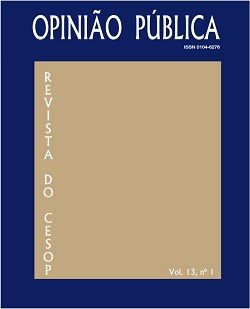Resumo
Estudos recentes sobre legitimidade democrática têm seguido uma perspectiva idealista que enfatiza a adesão dos cidadãos a valores fundamentais desta forma de governo. Alguns autores, entretanto, têm indicado que essa abordagem pode não ser adequada para a análise sobre países sem longa tradição democrática, propondo como alternativa um modelo realista que enfatiza como variável independente a avaliação de desempenho institucional. O presente artigo pretende contribuir para esse debate testando esse modelo alternativo para o caso brasileiro, utilizando dados produzidos pelo projeto World Values Surveys. Os resultados indicam que variáveis relacionadas a avaliações objetivas acerca do desempenho das instituições e das lideranças políticas têm um impacto maior sobre os níveis de legitimidade, em comparação com as variáveis referentes à adesão a valores.
Abstract
Recent studies about democratic legitimacy have been proceeding an idealistic perspective that emphasizes the adhesion of the citizens to value fundamental this government way. Some authors, however, have been indicating that approach cannot be adapted for the analysis of countries without long democratic tradition, proposing as alternative a realistic model that emphasizes as independent variable the evaluation of institutional performance. The article intends to contribute for that debate testing that alternative model for the Brazilian case, using data produced by the project World Values Surveys. The results indicate that varied related to objective evaluations concerning the performance of the institutions and of the political leaderships have a larger impact on the legitimacy levels, in comparison with the referring variables to the adhesion to value.
Key words: political legitimacy, democracy, performance, political values.
Referências
ALMOND, G.; VERBA, S. The Civic Culture: political attitudes and democracy in five nations. New York: Sage, 1989.
ALMOND, G; POWELL JR, B. Uma teoria da política comparada. Rio de Janeiro: Zahar, 1972.
BECKER, G. The Economic Approach to Human Behavior. Chicago: University of Chicago Press, 1976 COLEMAN, J.S. Fundations of social theory. Cambridge, Belknap Press, 1972 DALTON, R.J. Democratic challenges, democratic choices: the erosion of political support in advanced industrial democracies. Oxford: Oxford University Press, 2004.
DOWNS, A. Uma teoria econômica da democracia. São Paulo: Edusp, 1999
EASTON, D. A systems analysis of political life. New York: Wiley, 1965.
EASTON, D. Uma teoria de análise política. Rio de Janeiro: Zahar, 1968
INGLEHART, R. Cultural Shift in Advanced Industrial Society. Princeton: Princeton University Press, 1990.
INGLEHART, R. R. Modernization and Postmodernization: cultural, economic and political change in 43 societies. Princeton, NJ: Princeton University Press, 1997.
INGLEHART, R.; WELZEL, C. Modernization, cultural change, and democracy. Cambridge: Cambridge University Press, 2005.
MISHLER, W.; ROSE, R. Political support for incomplete democracies: realist vs. idealist theories and measures. International Political Science Review, vol. 22, n. 4, p. 303-320, 2001.
MOISÉS, J.A. Os brasileiros e a democracia. São Paulo: Ática, 1995.
NEWTON, K.; NORRIS, P. Confidence in public institutions: faith, culture or performance? In: PHARR, S. J.; PUTNAM, R. D. Disaffected democracies: what's troubling the trilateral countries? Princeton: Princeton University Press, 2000.
NORRIS, P. (ed.). Critical citizens: global support for democratic governance. Oxford: Oxford University Press, 1999.
OLSON, M. A lógica da ação coletiva. São Paulo: Edusp, 1999.
PEREIRA, C.; MUELLER, B. Uma Teoria da Preponderância do Poder Executivo: O Sistema de Comissões no Legislativo Brasileiro. Revista Brasileira de Ciências Sociais, vol. 15, n. 43, p. 45- 67, 2000.
PERISSINOTTO, R.M.; BRAUNERT, M.B. 2006. A direita, a esquerda e a democracia: os valores políticos dos parlamentares paranaenses (1995-2002). Opinião Pública, Campinas, vol. 12, n. 1, p. 114-135, abr-mai. 2006.
PETTIT, P. Republican theory and political trust. In: BRAITHWAITE, V.; LEVI, M. (Eds.). Trust and governance. New York: Sage, 1998.
PHARR, S.J.; PUTNAM, R.D.; DALTON, R.J. A quarter-century of declining confidence. Journal of Democracy, v.11, n.2, p. 5-25, 2000.
POWER, T.J; GONZÁLEZ, J.. Cultura política, capital social e percepções sobre corrupção: uma investigação quantitativa em nível mundial. Revista de Sociologia e Política, n. 25, p. 51- 69, 2003.
SELIGSON, M.A. Costa Rica exceptionalism: why the ‘Ticos’ are different. In: CAMP, R.A.(ED.). Citizen views of democracy in Latin American. Pittsburgh: University of Pittsburgh Press, 2001.
SELIGSON, M.A.; BOOTH, J.A.; GÓMEZ, B.M. Os contornos da cidadania crítica: explorando a legitimidade democrática. Opinião Pública, Campinas, vol. 12, n. 1, p. 1-37, abr/mai.2006.
WARREN, M.E.(ed.). Democracy and trust. Cambridge: Cambridge University Press, 2001.
A Opinião Pública utiliza a licença do Creative Commons (CC), preservando assim, a integridade dos artigos em ambiente de acesso aberto.

